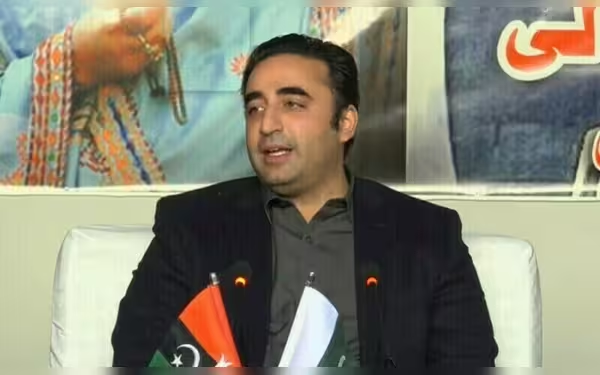Saturday, November 16, 2024 06:26 PM
PPP Chairman Bilawal Bhutto-Zardari Criticizes Federal Government's Flood Relief Efforts
- Bilawal Bhutto-Zardari criticizes flood relief fund management.
- Many flood victims await assistance for over two years.
- Calls for judicial reforms and establishment of Constitutional Court.
 Image Credits: dawn
Image Credits: dawnBilawal Bhutto-Zardari criticizes the federal government's handling of flood relief funds and calls for urgent judicial reforms in Pakistan.
In recent times, the issue of flood relief in Pakistan has become a contentious topic, particularly following the devastating floods of 2022. The aftermath of these floods left many families displaced and in dire need of assistance. The federal government had promised to provide aid to rehabilitate the victims, but concerns have arisen regarding the distribution and management of these funds.
PPP chairman Bilawal Bhutto-Zardari has publicly expressed his frustration over the federal government's handling of foreign aid meant for flood victims. During an event in Quetta, where he distributed compensation cheques to a select group of flood-affected individuals, he voiced his discontent about the limited scope of the relief efforts. He pointed out that many victims have been waiting for over two years for adequate support.
Mr. Bhutto-Zardari recalled his role as foreign minister in 2022, where he, alongside then-Prime Minister Shehbaz Sharif, secured significant foreign aid, including a $400 million loan from the World Bank. He criticized the federal government for converting this aid from US dollars to Pakistani rupees, which he believes undermines the intended support for Balochistan. He lamented that not a single house damaged in the floods has been rebuilt, highlighting the slow pace of rehabilitation efforts.
Furthermore, he warned that the 2022 floods would not be the last natural disaster the country faces. He emphasized the importance of maintaining good relations with international donors, who may question Pakistan's commitment to previous pledges during future aid requests. He urged both federal and provincial governments to act swiftly to address the ongoing challenges faced by flood victims, stating, "If both governments contribute, we can help more people."
In addition to discussing flood relief, Mr. Bhutto-Zardari also addressed the need for judicial reforms in Pakistan. He emphasized the establishment of a Constitutional Court, which he believes would ensure equal representation for all provinces. He referenced the Charter of Democracy, signed by his mother, former Prime Minister Benazir Bhutto, and PML-N leader Nawaz Sharif, which promised judicial reforms and the creation of constitutional courts for expedited justice.
He argued that the current political landscape presents a unique opportunity to realize these reforms, especially since no single party holds a two-thirds majority in parliament. This situation necessitates consensus among political parties for any decisions regarding the establishment of constitutional courts.
Mr. Bhutto-Zardari explained that constitutional courts would focus on political cases, which currently consume a disproportionate amount of the Supreme Court's time. He proposed setting up a Constitutional Court at both the federal and provincial levels to alleviate the burden on existing courts, allowing them to focus on civil and criminal matters.
However, he acknowledged that merely creating new courts would not resolve the backlog of cases. He called for a review of the judicial appointment process, advocating for the repeal of the 19th Amendment and a return to the procedures outlined in the 18th Amendment. He expressed concern that other political parties, such as PML-N and JUI-F, may resist this proposal due to their preference for merging the existing Judicial Commission with the parliamentary committee responsible for appointing judges.
The ongoing challenges surrounding flood relief and judicial reforms in Pakistan highlight the need for effective governance and collaboration among political parties. As the country continues to grapple with the consequences of natural disasters and the demand for justice, it is crucial for leaders to prioritize the welfare of the people and work towards sustainable solutions. The voices of leaders like Bilawal Bhutto-Zardari serve as a reminder of the responsibilities that come with political power and the importance of accountability in addressing the needs of the nation.













